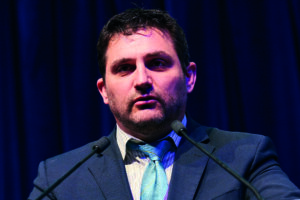
“The surgical challenges of repairing deep venous reflux have been present for more than a generation. It is worth reflecting on the fact that this new technology has made the majority of patients vastly better,” were the words of principal investigator David Dexter (Norfolk, United States) who presented podium-first efficacy results from the Surgical Anti-reflux Venous Valve Endoprosthesis (SAAVE) trial at the Charing Cross (CX) International Symposium 2024 (23–25 April, London, UK).
The trial evaluated the long-term efficacy of the VenoValve (EnVVeno Medical), a surgically implanted replacement venous valve for patients with deep chronic venous insufficiency (CVI). “These patients are the most severe of the severe,” Dexter detailed of their patient demographic, noting the trials’ inclusion of patients with Clinical, Etiological, Anatomical, Pathophysiological (CEAP) classifications between 4b and 6. He described that the “vast majority—around 60%—of these patients have active ulcers, and 70% of these ulcers had been active for at least a year”.
Dexter told delegates that a total of 69 patients were enrolled, 97% who had a successful valve implantation, leaving two patients with veins that were “too small or diseased” and so were reported as technical failures. The researchers then split the cohort into two subgroups defined by clinical improvement of revised Venous Clinical Severity Score (rVCSS) by ≥1, and clinically meaningful benefit with a rVCSS improvement of ≥3.
At 11-month follow-up, 65 (94%) patients showed clinical improvement of ≥1 and 50 (72%) presented clinically meaningful benefit of ≥3. “When we separated these two groups out,” Dexter said, “in the 50 patients who were meaningfully significant we saw a significant rVCSS drop, but the patients who weren’t meaningful didn’t get worse,” Dexter noted.
“The data presented shows that, for patients experiencing a clinical meaningful benefit rVCSS improvement of ≥3 points, the overall average rVCSS improvement was 8.46 points, including 9.29 points for patients at the two-year milestone, 8.08 points for patients at the one-year milestone, and 8.71 points for patients at the six-month milestone. All rVCSS evaluations were based on the patient’s most recent clinical visit, compared to baseline, for a weighted average of 11 months following VenoValve implantation for the clinically meaningful benefit patient cohort.”
Recording rVCSS and pain (Visual Analogue Scale [VAS]) scores at six, 12 and 24 months, Dexter stated that scores improved through each stage of follow up. rCVSS showed a 8.71-, 8.08-, and 9.29-point improvement, and average VAS score was recorded as 1.78, 2.05 and 2, respectively, in all patients. At 12-month follow up, quality-of-life and venous symptoms were also reported, VEINES-QoL and VEINES-Sym scores showing a 33% and 39% improvement.
“Overall, the VenoValve is a safe and effective surgery for the treatment of symptomatic patients with deep CVI,” Dexter said, concluding his presentation. Then, during panel questions, session moderator Manj Gohel (Cambridge, United Kingdom) highlighted the technical failure during valve implantation and whether this may lower efficacy in women with small veins.
“Clinically, on table, the vast majority of failures occurred preoperatively, and this was not based on gender. It’s really based on preexisting post-thrombotic syndrome that we didn’t identify on duplex,” Dexter responded.
Closing out the session, Gohel thanked Dexter and commented: “People have been trying to do this for decades. In terms of clinical data, this is as good as we’ve got with implanted valves, this research is very exciting.” Dexter stated that, although the VenoValve is currently investigational only, they hope with US Food and Drug Administration (FDA) evaluation of their endpoints, the device can be commercially-implanted soon.












